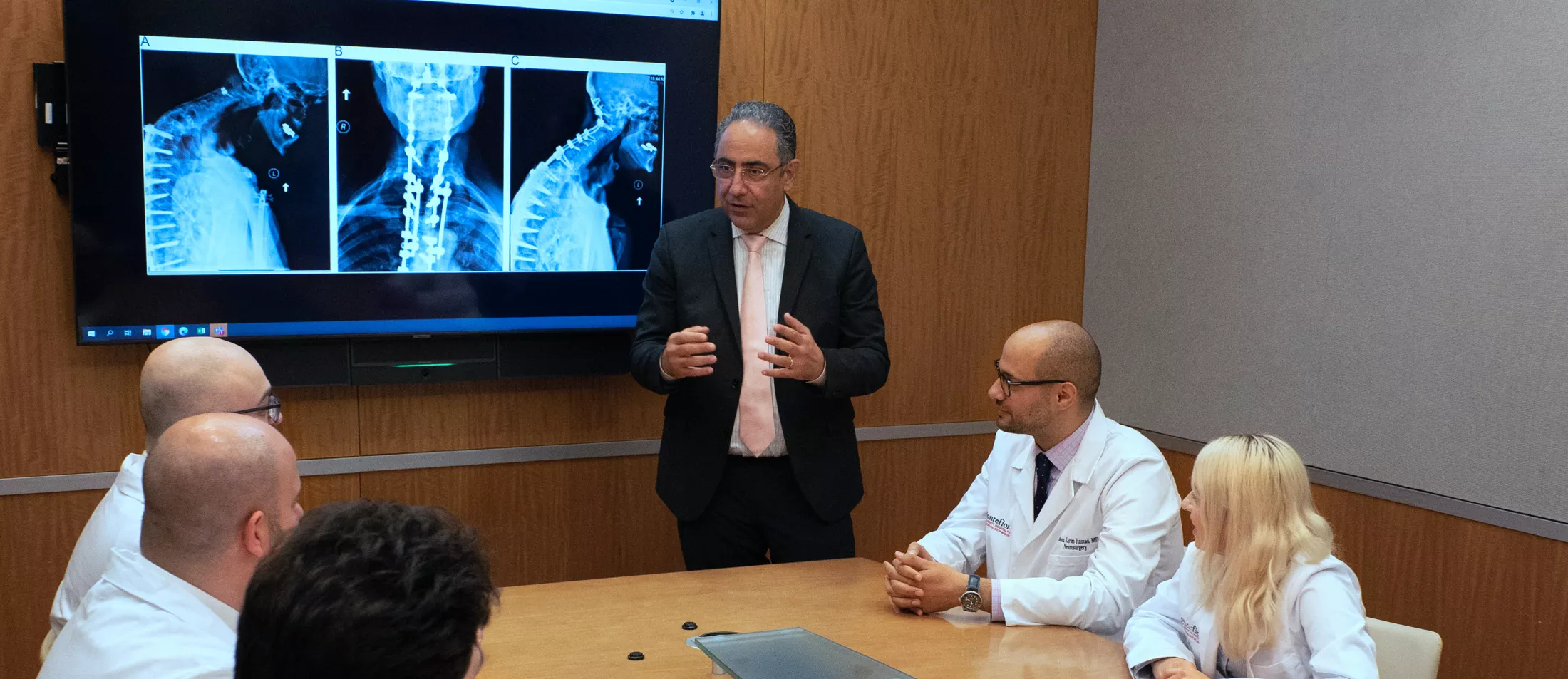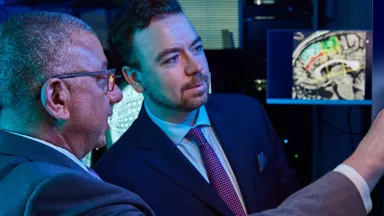Montefiore Einstein Department of Neurological Surgery Residency Program
The philosophical foundation of our training program centers on our faculty’s commitment to fostering and developing our residents’ careers. This constitutes a major strength of the Montefiore Einstein experience and its neurosurgical training. Our educational program is developed around a comprehensive surgical and educational curriculum that includes grand rounds, subspecialty conferences, cadaveric courses and interdisciplinary specialty and research conferences in both the clinical and basic neurosciences.
Residents complete the program having acquired the skills, knowledge and confidence to pursue any field they choose. Our commitment to our residents continues beyond the training years, and the faculty continues to be a guiding influence on the careers of our graduates. Collectively, as a group of physicians, educators, scientists, nurses and residents, we are working together to excel in the care of neurosurgical patients and to produce the next generation of neurosurgeons.

Broad Exposure to a Diverse Patient Population
While providing care for Montefiore Einstein’s more than 1.4 million patients in a department that performs more than 1,500 surgeries and procedures each year, residents gain broad surgical experience with some of the most unique and complex cases. Our residents join a department that is currently expanding, with the addition of new faculty and the active hiring of new attendings.
Surgical Training
Surgical training is broad and diverse, encompassing all aspects of neurological surgery, including neuro-oncology, cerebrovascular neurological surgery, spinal neurological surgery, pediatric neurological surgery and neurocritical care, as well as functional and epilepsy surgery. Our educational program is, therefore, developed around a comprehensive surgical and educational curriculum. Educational elements include neurological surgery grand rounds; neuro-oncology, vascular and spine conferences; journal clubs; cadaveric courses; and interdisciplinary specialty conferences in both the clinical and basic neurosciences.
Operative Training
Our operative education is based on a groundbreaking approach to residents’ training in the operating room using innovative, educational software technology and training modalities that allow for a standardized methodology to identify individual strengths and weaknesses. From that standardized platform, we can design individualized modules that optimize surgical training to meet the required educational standards while also catering to each physician’s unique needs.
Programmatic Divisions
In addition to wide and extensive experience in general neurosurgical conditions, the efforts of the Department of Neurological Surgery are focused in several major programmatic areas. The faculty is organized into areas of sub-specialization, giving the resident excellent exposure to each of these disciplines, in addition to the more general neurosurgical experience. The emphasis of the training program is on providing outstanding clinical experience and expertise in all fields that are appropriate for pursuing a career in academic or clinical neurological surgery. The volume and intensity of the exposure have enabled many graduates of the program to obtain positions without taking additional fellowship training.
Cerebrovascular Disease
All aspects of cerebrovascular disease are managed at the participating hospitals. Microsurgical management of aneurysms and arteriovenous malformations is an area of major interest. In addition, interventional neuroradiology with the availability of intra-arterial embolization, angioplasty and stenting has increased our ability to manage the complex disorders that are referred to us at both hospital sites. Merritt Kinon, MD, Vijay Yanamadala, MD, and Reza Yassari, MD, are responsible for the management of intracranial and extracranial cerebrovascular disorders.
Neuro-Oncology
Active programs in surgery and treatment of brain tumors exist at both Montefiore and Roosevelt Hospital. These include the management of benign and malignant tumors in both adult and pediatric populations. In addition to neurosurgical management, emphasis is placed on the multidisciplinary management of these complex problems. Close interaction among neurological surgery, neuro-oncology and radiation oncology through the Tumor Board provides an opportunity for the residents to be exposed to current protocols and management strategies. The Department of Neurological Surgery is also a participant in the Montefiore Einstein Comprehensive Cancer Center. Diagnostic facilities include CT and MRI imaging and spectroscopy, as well as PET and SPECT scanning. Surgical management utilizes the latest surgical techniques, including advanced microsurgical methods, frameless stereotactic guidance, ultrasound and endoscopic visualization. Radiosurgery is also available. Patrick A. LaSala, MD, and Rick Abbott, MD, at Montefiore Einstein and Dr. LaSala, Dr. Abbott and Adesh Tandon, MD, at Roosevelt Hospital supervise the adult and pediatric tumor programs.
Epilepsy
Patients with complex partial seizure disorders are evaluated for management and consideration for surgical treatment. Facilities for monitoring patients with implanted electrodes to aid in localization are available at both sites. PET scanning is used to complement the electrophysiologic localization of the seizure focus. Dr. LaSala and Dr. Abbott direct the adult and pediatric surgical program in epilepsy and collaborate with The Epilepsy Center of the Department of Neurological Surgery.
Spine Surgery
An extensive program in advanced techniques of spine surgery, including stabilization techniques, is available. Collaboration with orthopedics is encouraged. Merritt Kinon, MD, Vijay Yanamadala, MD, and Reza Yassari, MD, are responsible for these programs.
Skull Base & Reconstructive Surgery
An integrated program in complex skull base surgery has been developed with the Department of Otorhinolaryngology. Surgical laboratory facilities are available to prepare the residents for involvement with adult and pediatric patients who have tumors and congenital abnormalities. The rotation at Roosevelt Hospital is under the direction of Garet Gordon, MD a former fellow of Montefiore Einstein. Milan K. Sen, MD, directs the efforts at Montefiore Einstein.
Pediatric Neurological Surgery
Andrew J. Kobets, MD and Mandana Behbahani, MD see the general range of pediatric neurosurgical cases at Children's Hospital at Montefiore, with special emphasis on craniofacial reconstruction for congenital abnormalities and brain and spinal cord tumors.
Program Components
The Neurological Surgery Residency Training Program at Montefiore Einstein admits one to two residents each year for seven years of clinical and research training, challenging them with graduated responsibilities and progressive independence.
After the internship year, the clinical rotations are structured at both the junior and senior levels (two years each), followed by one year of in-depth training or research, culminating in a final year as a chief resident.
Rotations
The Department of Neurological Surgery is organized along subspecialty lines with concentrated experience in the areas of cerebrovascular disease; neuro-oncology and skull-base surgery; and spinal, functional and pediatric neurological surgery. Each rotation is structured to ensure a graded and increasing level of responsibility as the resident progresses through the training.
We also offer peripheral nerve surgery rotations with the Department of Orthopedic Surgery.
A Broader Curriculum
In addition to clinical and surgical training, the curriculum offers educational and didactic opportunities in both informal and formal settings.
A formal weekly lecture series covers a number of important topics in preparation for the written boards. The program also includes neurological surgery grand rounds and spine and vascular conferences, as well as Tumor Board and operative conferences. The weekly resident forum meeting provides residents with a platform to discuss concerns and ideas and encourages the active involvement of residents in the programmatic and clinical curriculum.
Regular journal clubs, the Morbidity and Mortality Conference, cadaveric dissection courses and an educational program utilizing the infrastructures provided by the American Association of Neurological Surgeons (AANS) and the Congress of Neurological Surgeons (CNS), as well as AOSpine and industry-sponsored courses, all provide well-rounded and in-depth exposure to the entire spectrum of clinical neurological surgery. In addition, all residents participate in a hospital-sponsored patient safety and medical ethics conference. Finally, our residents have the chance to gain experience in global neurological surgery through an annual neurosurgical mission program to Mongolia.
Residents who have been matched with the Montefiore Einstein Department of Neurological Surgery are required to participate in the neurosurgical internship at Montefiore Einstein, which provides residents with a foundation in the principles and practices of neurological surgery and the clinical neurosciences on which they are based.
The neurological surgery internship consists of rotations in the Neuro-ICU, as well as in neuroradiology/neuropathology, clinical neurological surgery, neurology, anesthesia, plastic surgery and orthopedics.
To qualify for Neurological Surgery Junior Training, residents must have successfully completed and gained credit in the neurological surgery internship in accordance with Neurological Surgery Residency Review Committee (RCC) guidelines by demonstrating competency in all the general medical and surgical principles of patient care. They must also possess medical knowledge and interpersonal and communication skills and exude professionalism throughout each stage of the training program. Residents must also demonstrate knowledge of patient rights, including Healthcare Insurance Portability and Accountability Act (HIPAA) requirements and the appropriate use of restraints and seclusion.
In the PGY-2 and PGY-3 years, residents are integrated into a two-year junior training rotation. The two-year junior residency is divided into three blocks of eight-month rotations in pediatric, cranial and spine services.
The junior residents are paired with seniors during each rotation and assume increasingly more direct responsibility in patient evaluation, management and surgery.
PGY-4s and PGY-5s are integrated into a two-year rotation as senior residents. The two years are divided into three blocks of eight-month rotations on the pediatric and spinal services as well as an interventional and peripheral nerve rotation with orthopedics. For each rotation, the senior resident will be assigned to a team of attending physicians and will have a direct supervisory role over their designated junior residents.
In addition to the surgical procedures for each of the rotations, residents must demonstrate a command of all competency-based principles of patient care, medical knowledge, interpersonal and communication skills and professionalism. At the end of this training period, senior residents should have completed all of the surgical and procedural requirements.
The focus of the PGY-6 year of residency is an independent research project under the auspices of a research mentor from the faculty of the Department of Neurological Surgery. The resident will choose a faculty research mentor and will work under their direct supervision. The resident will formulate a clearly delineated research project at the beginning of the year and will schedule regular meetings with the program director and research mentor to evaluate their progress.
Clinical research collaboration with other departments, as well as the medical school and its basic science infrastructures, is strongly encouraged. Alternatively, an integrated fellowship can be arranged at the resident’s request, contingent upon availability and the program director's approval.
Over the duration of the training program, residents progress from working as supervised patient care providers and surgical assistants to competent practitioners who can function and operate independently with faculty acting as backup support.
Neurological Surgery PGY-7 residents must demonstrate competence in all principles of patient care, medical knowledge, interpersonal and communication skills and professionalism, as well as in all procedures required of a Neurological Surgery PGY-6 resident prior to becoming chief residents. In addition, the resident must obtain a passing grade on the American Board of Neurological Surgery (ABNS) written examination.
Conference Schedule
- Oncology–Tumor Board (Adults)
Mondays, 12:00 PM–1:00 PM
- Neurological Surgery/Neurology–Stroke Conference
Wednesdays, 5:30 PM–6:30 PM
- Neurology–Epilepsy Conference
Every other Wednesday, 8:00 AM–9:00 AM
- Oncology–Tumor Board (Pediatrics)
Thursdays, 12:00 PM–1:00 PM
- Neurological Surgery–Grand Rounds
Fridays, 7:30 AM–8:30 AM
How to Apply
We look forward to contributing to your success, and we strongly believe that our training program can provide you with the tools to attain your goal of becoming a leader in neurological surgery.
If you would like to apply to become a Neurological Surgery resident at Montefiore Einstein, here is some information to keep in mind:
February 1—Ranking opens
March 3—Rank Order List certification deadline
March 15—Match Day
If you have any questions, feel free to contact our program coordinator, Maria Camacho, directly at 718-920-4216 or marrodri@montefiore.org.
Donate to Neurological Surgery Research
Thanks to our current visionary philanthropic partners, we stand as leaders in developing novel treatments, and are on the cusp of new breakthroughs. But we need your support. Consider a financial donation that could be directed towards game-changing research projects that can make a difference for the next generation of patients and their families.





